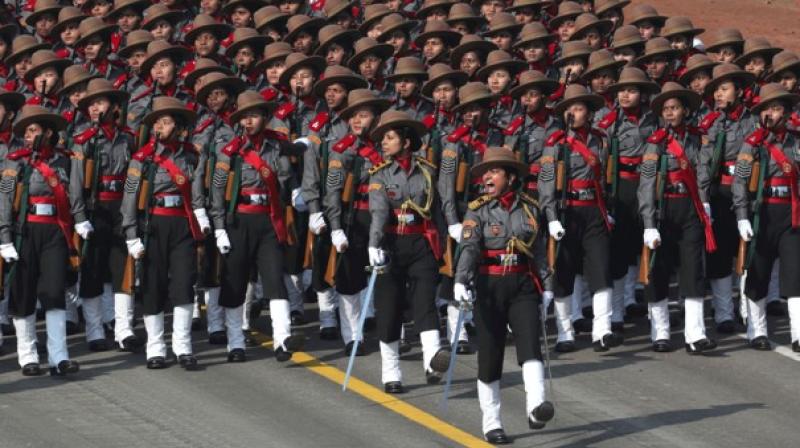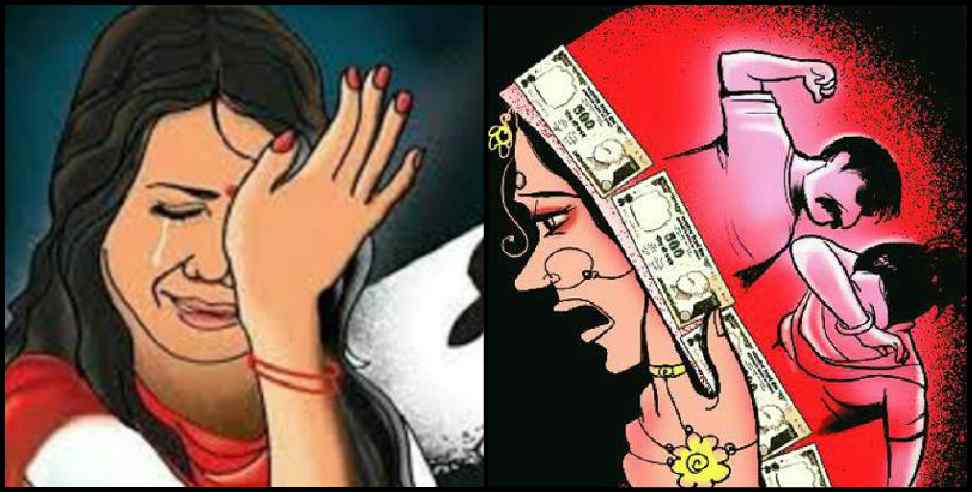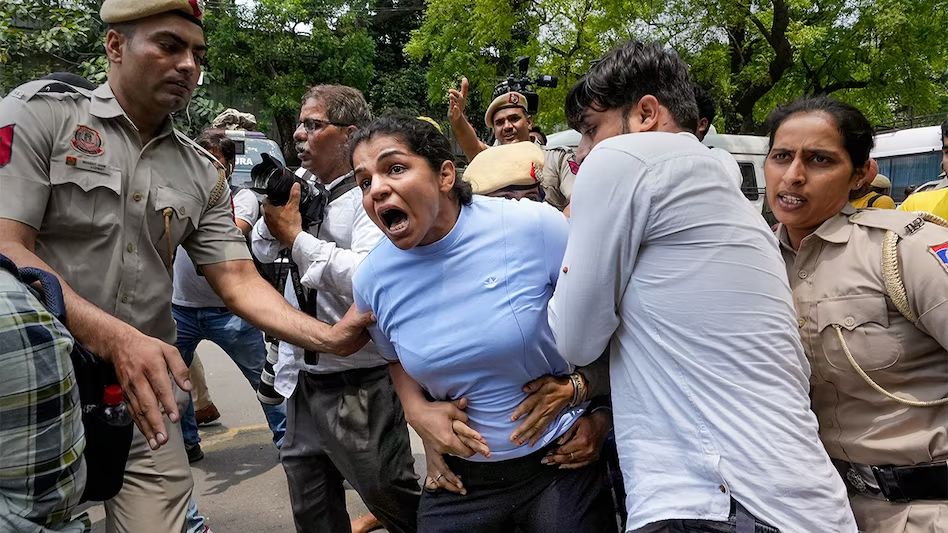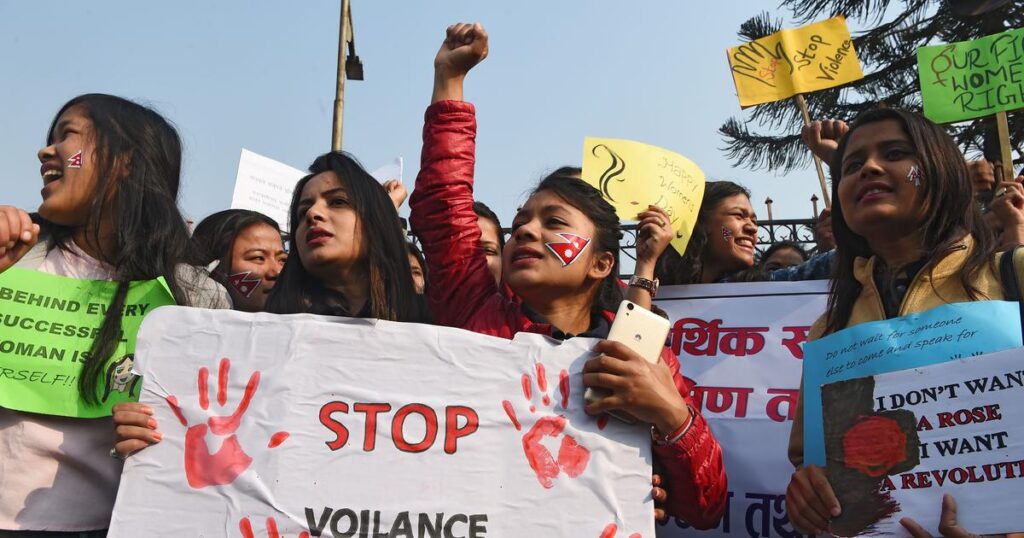By Sushiila Ttiwari Managing Director, https://7qube.com/
&
D. Samarender Reddy Director, https://7qube.com/
India, a vibrant democracy, proudly showcased its egalitarian ideals on the 26th of January, 2024. The all-women contingent marching down Rajpath seemed to herald a new dawn. Awards were bestowed upon women who shattered glass ceilings, their achievements casting a luminous spotlight on the nation’s strides towards gender equality. Yet, under the veneer of this celebratory facade lurks a stark reality: the discordance of sexual violence orchestrated by figures within the very party that champions national pride – the Bharatiya Janata Party (BJP).
The Stark Contrast
The all-women contingent was a visual affirmation of the capabilities and contributions of women to the nation’s defence and security. However, to celebrate this progress without acknowledging the persistent systemic inequalities and the rampant instances of violence against women would be to engage in a dangerous form of tokenism.

When women are forced to navigate daily life under the constant threat of predatory advances, their freedom and autonomy are severely curtailed. The BJP’s own recent scandal involving a party spokesperson accused of sexual harassment demonstrates the pervasiveness of the problem and the lack of accountability even within their own ranks.
These incidents, unfortunately, are not isolated. Gender-based violence remains a pervasive reality in India, with an estimated crime against women occurring every 15 minutes. The cases involving powerful figures further expose the deep-rooted patriarchal structures that permeate Indian society and the institutional failures that often shield perpetrators from accountability.
Through the Feminist Lens
There are systemic structures that perpetuate gender inequality. From liberal feminism’s call for equal opportunity to radical feminism’s critique of patriarchy, there is a resounding consensus: women’s bodies and lives are not trophies to be displayed on celebratory days. They are battlegrounds where the fight for social justice is waged against deeply entrenched power imbalances.

The parade challenges traditional notions of female subservience and asserts women’s rightful place in the public sphere. Yet, the continued prevalence of sexual violence, often perpetrated by those in positions of power, reveals the deep-seated patriarchal structures that continue to subjugate women.
The very act of sexual violence is a potent symbol of these imbalances. When a BJP leader violates a woman’s body, he is not simply committing a heinous crime; he is wielding the power dynamics ingrained within a patriarchal society. He is asserting his dominance over a gender deemed “other,” reaffirming the historical subjugation of women within the social hierarchy.
The Weight of Patriarchy
The lens of gender discrimination further illuminates the stark contrast between the symbolic progress and the lived experiences of many Indian women. The delayed justice for victims of sexual assault, the bureaucratic hurdles they face in registering their cases, and the culture of silence surrounding these crimes speak volumes about the systemic inequalities that render women vulnerable. The very act of reporting a crime becomes an ordeal, a testament to the power imbalances that favour the perpetrator.
This systemic failure stems from a multitude of factors, including inadequate police training, societal stigma, and a culture of victim blaming. The emotional trauma and the arduous legal battles further compound the suffering of victims, leaving them vulnerable and voiceless.

Beyond the legal system, the societal attitudes towards women and the pervasive notion of male entitlement contribute significantly to the culture of violence. Traditional gender roles that confine women to the domestic sphere and limit their access to education and economic opportunities perpetuate their vulnerability. Furthermore, the normalization of sexist jokes, casual harassment, and everyday microaggressions create a climate where violence against women is seen as acceptable or even inevitable.
The Double Bind
These constant violations against women raise questions about power, justice, and the legitimacy of governance. The hypocrisy is glaring: how can a party celebrating womanhood on one hand turn a blind eye to the atrocities inflicted upon women by its own members on the other?
This double bind exposes the limitations of relying solely on representational politics. While having women in positions of power is crucial, it cannot be the sole answer to dismantling systemic oppression. True change requires a fundamental shift in power dynamics, a dismantling of the very structures that privilege and protect perpetrators.
Beyond Tokenism and Trophy Parades
Women’s empowerment is not about token gestures or celebratory displays. It is also not simply about granting women access to education and employment opportunities, though these are necessary steps. It is about dismantling the patriarchal mindset that fuels gender-based violence and discrimination. It is about creating a society where women are not merely tolerated, but actively valued and respected as equal citizens. It is about ensuring that women’s voices, not their bodies, become the instruments of power. This requires a fundamental shift in power dynamics, a redistribution of resources, and a reimagining of social structures.
The voices of women, silenced for centuries, are finally finding their way into the public discourse. Movements like #MeToo and #Nirbhaya have brought the issue of sexual violence to the forefront, demanding accountability and justice. This grassroots activism, fuelled by feminist principles, is essential in challenging the status quo and pushing for meaningful change.

The Way Forward
To dismantle this entrenched system and truly empower women, a multi-pronged approach is necessary.
Firstly, there needs to be a paradigm shift in societal attitudes towards women. This requires challenging patriarchal norms, promoting gender equality in education and employment, and fostering a culture of respect and consent.
Secondly, the legal system must undergo significant reform. This includes fast-tracking rape trials, providing adequate training for police and judicial officers, and ensuring victim protection and support throughout the legal process.
Thirdly, political parties must move beyond token gestures and implement concrete policies that address the root causes of gender-based violence, such as economic inequality and limited access to education.
Finally, and perhaps most importantly, women themselves must be empowered to speak out against injustice, to demand accountability, and to claim their rightful place in society. This requires fostering a sense of self-worth and collective consciousness among women, providing them with safe spaces to share their experiences, and equipping them with the tools and resources to fight for their rights.
Courtesy Telangana Today










More Stories
Will Indian Medical Association also come out against medicine pharma companies?
There is a history hidden behind Hansraj College.
Explained: A short history of Iran-Israel ties and why they soured after 1979